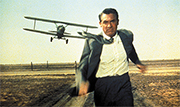
What's your favorite film? Is there a movie that changed your life? Send us an essay of 500 words, give or take, about that film you can't forget – classic or contemporary – and we'll consider it for publication in these pages. In addition to your short essay, send your name, occupation, hometown, phone number, jpeg headshot and e-mail address to Editor@AFI.com. We reserve the right to edit for length and clarity.
READER REVIEW: THE STATION AGENT
By Lane Kneedler

Lane Kneedler is the Associate Director, Programming of AFI FEST.
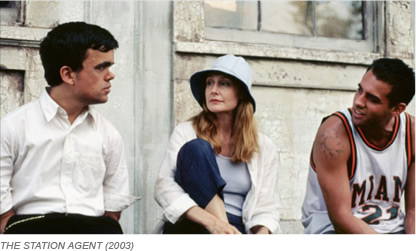 I've just returned from the 30th anniversary edition of the Sundance Film Festival, and I cannot overstate the role Sundance has played in developing my film-going sensibilities. Sundance is where my professional career began, and the films I've seen there over the last 15 or so years have profoundly changed my view of cinema. Sundance has also had a huge influence on our culture with films ranging from CLERKS to RESERVOIR DOGS springing from this event in the mountains.
I've just returned from the 30th anniversary edition of the Sundance Film Festival, and I cannot overstate the role Sundance has played in developing my film-going sensibilities. Sundance is where my professional career began, and the films I've seen there over the last 15 or so years have profoundly changed my view of cinema. Sundance has also had a huge influence on our culture with films ranging from CLERKS to RESERVOIR DOGS springing from this event in the mountains.
Over the years, I've made it a point to watch as many Sundance award winners as possible and have fallen in love with singular filmmakers like Hal Hartley and Errol Morris as a result. However, there was one film that, for some reason, had slipped under my radar: THE STATION AGENT. This is such a quintessential Sundance film that it was even the punch line of a joke on the TV show ENTOURAGE. The agent played by Jeremy Piven advises a director not to pin his hopes on the festival, saying “you know what was a big hit at Sundance? THE STATION AGENT.”
THE STATION AGENT was the debut film of director Tom McCarthy who has since gone on to direct THE VISITOR and WIN WIN, two excellent character studies exploring themes of connection and isolation. THE STATION AGENT stars Peter Dinklage as Finbar McBride, a lonely man who wants to be left alone by a rude and uncaring world. When his best friend, an elderly shopkeeper, dies, “Fin” inherits a small plot of land that includes an abandoned train depot. Rather than sell the land, Fin decided to move there for the isolation he so clearly desires. It's a lonely patch of land, but soon Joe, a coffee truck owner who parks outside Fin's home, interrupts his solitude. As played by Bobby Cannavale, Joe is sweet-natured but a little dense and much too talkative for Fin. The final piece of the puzzle comes in the form of the suffering Olivia (Patricia Clarkson), who has lost a child and will never truly recover. In this soft, rural setting these three awkward people slowly come together to form a support system for each other, at times rejecting one another, then reconciling as time goes by. The film succeeds on the strength of McCarthy's assured directing hand. As a first time director, he composes his shots extremely carefully and takes advantage of the natural beauty of his location. His later films do not emphasize such elaborate visual staging, but use a more restrained mise-en-scene. This is not to suggest that his later films are not as good as THE STATION AGENT. I highly recommend you also check out his third film WIN WIN, another exceptional character study by Bobby Cannavale in an understated yet delightful role.
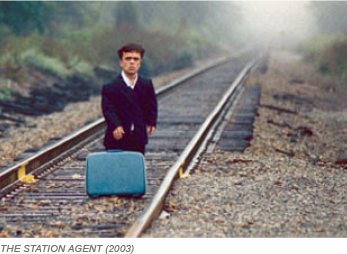 The other major strength of THE STATION AGENT is the casting and it's no surprise that McCarthy uses his favorite actors time and again. Peter Dinklage was 34 when he appeared in this film and had done a number of fairly high-profile films previously, but this is the role that energized his career and opened up numerous opportunities to him afterwards. One wonders if McCarthy wrote the role of Fin with Dinklage in mind. If not, he must have gone over the moon when he found him. His performance here is a nuanced masterpiece that clearly draws on real life frustrations and experiences. Also a highlight in a much smaller role is a very young Michelle Williams and a virtually unknown John Slattery. The casting is pure gold in this indie, and the cast is fresh-faced and invigorated by the high caliber of the work they are given to do here.
The other major strength of THE STATION AGENT is the casting and it's no surprise that McCarthy uses his favorite actors time and again. Peter Dinklage was 34 when he appeared in this film and had done a number of fairly high-profile films previously, but this is the role that energized his career and opened up numerous opportunities to him afterwards. One wonders if McCarthy wrote the role of Fin with Dinklage in mind. If not, he must have gone over the moon when he found him. His performance here is a nuanced masterpiece that clearly draws on real life frustrations and experiences. Also a highlight in a much smaller role is a very young Michelle Williams and a virtually unknown John Slattery. The casting is pure gold in this indie, and the cast is fresh-faced and invigorated by the high caliber of the work they are given to do here.
I can see why the film was the punch line for that ENTOURAGE joke – it's open ended, without a traditional Hollywood conflict and structure. Not a conventional love story, THE STATION AGENT instead relies on character and relationships to fuel the narrative engine of the film. However, that's why the film is so successful. McCarthy's storytelling feels like a breath of fresh air in today's cinematic world. A fantastic debut and a well-deserved award winner, THE STATION AGENT, even years later, stands as a clear tribute to the way festivals showcase low-budget, independent filmmakers and connect them to audiences.
READER REVIEW: AUNTIE MAME
By Camille Lowry

Camille Lowry is a freelance writer, who also does PR for a philanthropic organization.
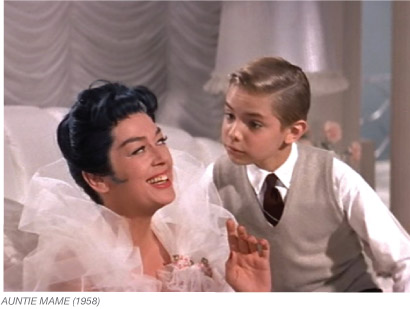 One of my all-time favorite films is AUNTIE MAME. I'm a fan of movies with strong female protagonists. Mame is that and then some.
One of my all-time favorite films is AUNTIE MAME. I'm a fan of movies with strong female protagonists. Mame is that and then some.
The 1958 comedy centers on Mame Dennis, a wealthy Manhattanite. She is an eccentric and forward-thinking woman equipped with cutting, deadpan wit. Original, funny and warm, Mame made an imprint on my mind and spoke to my soul.
My mother and I watched and bonded over the movie yearly. The film presented a model and code that my mother and I chose to live by. Both of us have a bit of gypsy spirit, and we attribute this movie as motivation for many of the adventures we've enjoyed.
AUNTIE MAME, an adaption of the bestselling 1955 book, the 1956 Broadway play and inspiration for the 1966 Broadway musical "Mame," stars the great Rosalind Russell in the title role. The film follows Mame over decades, beginning in 1928 when she assumes the guardianship of her late brother's 10-year-old son Patrick. Patrick is delivered to her home in the throes of a party, giving him an immediate introduction to the wide range of characters she keeps in her life – actors, composers, publishers and even a monkey. When she sees Patrick it's love at first sight. And Patrick does not blink an eye at Mame's world, or the colorful folks around her.
She runs into trouble when she sends Patrick to a progressive nudist school. Mame's main adversary is Mr. Babcock, a staunch conservative banker. He is the trustee of her nephew and set on shaping Patrick in his mold. He also has plans to place Patrick in a school that Babcock describes as exclusive and restricted. To which Mame asks, "Exclusively what and restricted to whom?" Babcock becomes horrified to find Patrick at the bohemian school, and sends Patrick away to boarding school.
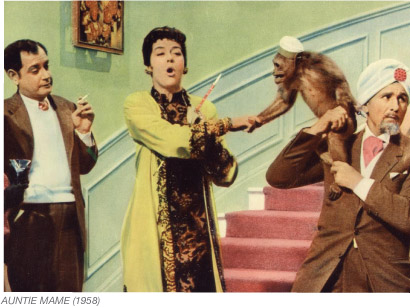 Mame's next challenge is how to survive after the stock crashes. We see her struggle to keep afloat with a series of ill-suited jobs: hamming it up in a small role in the theater, getting tangled in wires as a telephone operator, and as a Macy's roller skate saleswoman who only knows how to ring up purchases as COD.
Mame's next challenge is how to survive after the stock crashes. We see her struggle to keep afloat with a series of ill-suited jobs: hamming it up in a small role in the theater, getting tangled in wires as a telephone operator, and as a Macy's roller skate saleswoman who only knows how to ring up purchases as COD.
She falls in love with a kind wealthy oilman named Beauregard Jackson Pickett Burnside. He marries her and squires her away to travel around the world. She sends Patrick letters from camels, the Eiffel tower and the tops of mountains, until her husband suffers a fatal fall.
In the last act she returns to NY and to an older Patrick. She is dismayed to find that he has fallen in with a snobby set. She concocts some schemes to steer him away from a shallow fiancé who speaks in a lockjaw accent and declares everything "top drawer." The fiance's parents express concern at the idea of a Jewish cellist moving near them. Mame purchases the plot of land next to the bigoted parents' home – to build a home for Jewish refugee children. And she serves the snobs rattlesnake appetizers to boot. I love her spunk.
Filled with snappy dialogue, it's an easily quotable film. But there's one line that sums up both Mame and the main theme of the film. She encourages her drab, but loveable secretary Agnes Gooch to attend a party by saying, "Live! Life's a banquet and most poor suckers are starving to death!"
The film touches on real life issues – financial hardship, the loss of a loved one, bigotry. I appreciate the way Mame keeps going at moments of adversity and reinvents herself. It's largely a film that encourages one to be oneself and to live boldly. Whenever I finish watching it, I am left inspired to experience as much of life as I can.
Edit Here
|
Edit Here |

